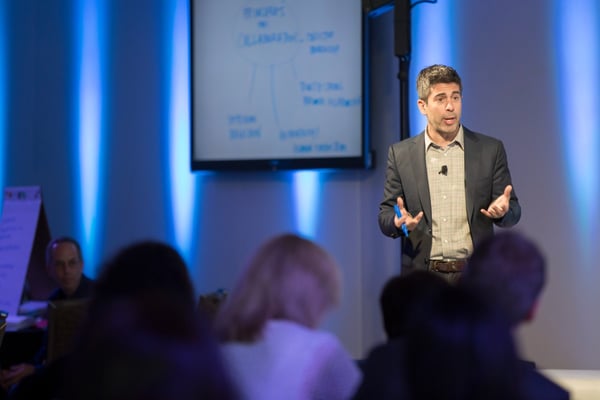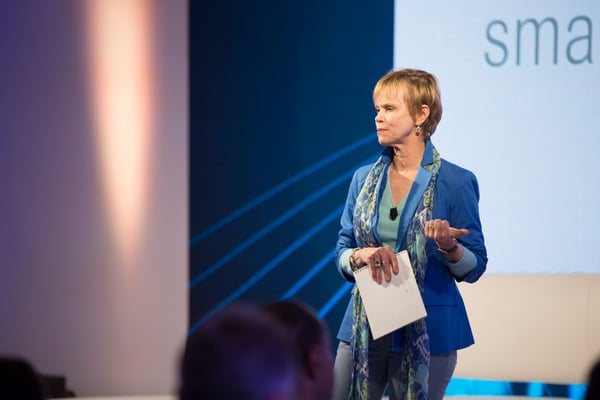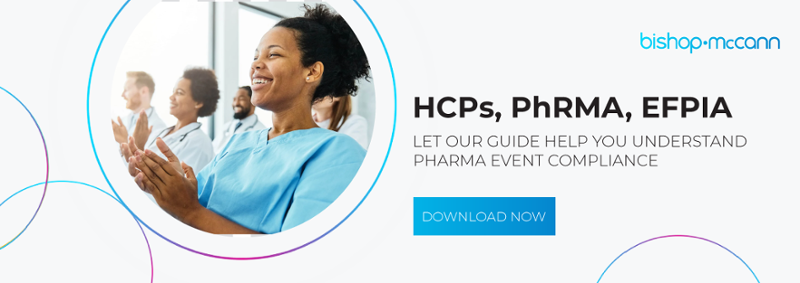 The attendee audience is always a major element of the event planning process. In planning pharmaceutical events in particular, the attendee list is a major driver of the overall program design. Pharma meetings can be complicated. HCPs must adhere to strict regulations, so understanding how to best handle compliance becomes a vital part of the planning process.
The attendee audience is always a major element of the event planning process. In planning pharmaceutical events in particular, the attendee list is a major driver of the overall program design. Pharma meetings can be complicated. HCPs must adhere to strict regulations, so understanding how to best handle compliance becomes a vital part of the planning process.
Quick Links
- What Are HCPs?
- What Type of Pharmaceutical Events Do HCPs Attend?
- What Are HCP Compliance Requirements for Pharmaceutical Events?
- Top Tips for Handling HCP Compliance at Pharmaceutical Events
What Are HCPs?
Healthcare professionals, or HCPs, include any person who works in a healthcare role for a healthcare facility or practice, such as a hospital, or in a research capacity for a large university-affiliated hospital. Typically, they are authorized or licensed to provide patients with a diagnosis and treatment plan, pharmaceutical interventions, and other treatment modalities.
When it comes to pharmaceutical events, HCPs may represent any number of healthcare organizations and healthcare roles, including doctors, nurses, pharmacists, and more. Essentially, anyone who may play a role in the prescription process, from prescribing and recommending, to supplying and dispensing.
What Type of Pharmaceutical Events Do HCPs Attend?
Given their role in the prescription process, HCPs may be present at any pharmaceutical event. However, their role at each of those events often differs.
Investigator Meeting/Research and Development (R&D) - Research and development meetings follow pre-clinical research and start with Phase 1 trials. Phase 1 clinical trials introduce healthy patients to a new drug and assess its relative safety. Phase 2 clinical trials introduce more patients who have the condition the drug is designed to treat. Phase 3 clinical trials grow further (and wider geographically) to provide additional information about the efficacy of the drug.
After each of these phases, pharmaceutical companies gather the HCPs who participated to review data, insights, and experiences. Obviously, each successive meeting informs the ability and desire to move on to the next phase. These meetings are vital, and HCPs play an imperative role.
Advisory Meeting - These meetings occur to discuss the status of pharmaceutical products and often involve key opinion leaders (KOLs) and HCPs. The primary goal is to help address obstacles and challenges, facilitate conversations, and leave with actionable insights to help improve a specific part of the pharmaceutical journey.
Launch Meeting - When a pharmaceutical product is ready to be released, launch meetings are typically celebratory events. They include the pharma company’s internal teams, such as sales, marketing, and more. Some sessions are designed to help sales and marketing team members better understand the product and how it will be positioned in the market. For this reason, HCPs may be in attendance to provide clinical information and explanations of clinical research and results.
National Sales Meeting - Similar to launch meetings, NSMs gather many of the same people, though some may be from wider geographic areas. Similarly, they may also include a small number of HCPs to play a similar role. At these events, HCPs may be in discussion with pharmaceutical company employees regarding questions the sales team receives in the field. During the research process, HCPs also invest a significant amount of time and energy into development, so they have a vested interest in learning and understanding how the drug is being rolled out and received by other HCPs.
Essentially, HCPs are in a unique position. They are invaluable to the entire pharma process, and they may be in attendance at any of these pharmaceutical meetings and events. Regardless of the goals, if an HCP is in attendance, it’s a game changer from an event planning and logistics standpoint.
 What Are HCP Compliance Requirements for Pharmaceutical Events?
What Are HCP Compliance Requirements for Pharmaceutical Events?
In 2007, lawmakers passed the Physicians Payments Sunshine Act. The Sunshine Act is a federal law that requires payments and transfers of value made by life science manufacturers of covered drugs, devices, biologics, or medical supplies to physicians, physician assistants, advanced practice nurses, and teaching hospitals to be collected and tracked. What does that mean? That anything that physicians or teaching hospitals are gifted has to be reported. It’s great for us as patients, just a little more work for us as event professionals! Thankfully, we’ve been handling pharmaceutical and medical meetings since 1997.
That leads us to TOV (transfer of value) Reporting, reporting that happens at each and every event involving healthcare professionals. If it’s worth more than $10, it is reported, and it’s our responsibility as meeting professionals to get it right.
From the Sunshine Act came the Open Payments Program. The Open Payments Program is a nationwide, government-run site that openly lists payments made to HCPs by both medical device and pharmaceutical companies. The program fosters responsibility and transparency across the healthcare industry. What HCPs can accept is dependent upon both the regulations of their home state (or country if based outside the US), and also must reflect what a pharmaceutical company is comfortable transferring. Regardless of what value is transferred, it all must be recorded and reported.
There are a few key dates to keep in mind with the Open Payments Cycle. While information is gathered year round, data submission is entered for the previous year from February 1st through March 31st. From there, HCPs have between April 1st and May 15th to review, and potentially dispute any reported data, and corrections to reported data must be made by May 30th. By June 30th of any given year, all data is published for public consumption.
Unfortunately, the regulations are complex and are constantly evolving, and they can vary depending upon the HCP’s state/country of residence or employment.
A general outline of the regulations looks something like this:
- You must report the event’s goal and attendance. What happened and who was there?
- You must track and record any items that transfer value. This includes:
-
- Food and beverage
- Accommodations
- Travel expenses
- Honorariums/consultation fees
- Charitable contributions
- Entertainment
- And more…
- You cannot give HCPs swag or gifts.
The primary goal here, as you can imagine, is to provide full transparency regarding the role of HCPs in the research, development, and release of pharmaceuticals. The Sunshine Act and Open Payments Program requirements allow everyone (regulators and the public) to see the interactions between pharma companies and the HCPs who conduct research, as well as recommend and prescribe their products. For that reason, detailed record keeping is essential and is a requirement an event planner should be prepared for.
 Top Tips for Handling HCP Compliance at Pharmaceutical Events
Top Tips for Handling HCP Compliance at Pharmaceutical Events
Pharmaceutical events are not for the casual event planner. Given the complexity and rigidity of the compliance requirements, as well as the cost of non-compliance (up to a million dollars in fines and additional audits), there’s just too much that can go wrong if these events are not given the gravity they require.
However, there are strategies to help you prepare and manage pharmaceutical meetings and events.
1. Understand the requirements
Going into a pharma event without a clear understanding of what’s required can quickly lead to your team feeling overwhelmed and could even lead to subpar record keeping. Further, most pharmaceutical companies are keenly aware of what’s required of them when it comes to HCPs, and they’ll expect the same of you.
2. Partner up
We mean this in a few ways. First, consider partnering with event planners who have pharma experience to assist you with event execution. Dividing the labor and responsibilities can ensure someone is focusing on compliance.
Second, partner with venues and vendors who also have pharma experience. These teams will know how to handle HCPs from creating separate menus and adhering to price caps, to helping you set up separate registration areas, and more.
Finally, Bishop-McCann pairs HCPs with team members who are responsible for guiding them and assisting them as they move through the event. These individuals are mindful of the regulations, but they can also ensure HCPs have a positive event experience despite the potential differences between them and internal attendees.
3. Familiarize yourself with the HCPs
While getting to know them is great, what we really mean is that you should know who your HCPs are and where they’re coming from beforehand. As we noted earlier, the regulations can vary depending on a few different factors. No one expects you to recite the regulations by rote, but there is some expectation that you’ll be versed in the regulations and have familiarity with variations.
The bottom line is that there’s much to consider when it comes to pharmaceutical events. From a planning and logistics perspective, they’re more complicated than other corporate events, so beginning with an idea of what to expect and how best to meet the challenges is a smart move.
If you’re ready to plan a pharmaceutical meeting or event, then it’s worth noting Bishop-McCann’s roots are in the pharma space. We have the experience and expertise to help you create an event that not only pleases attendees but conforms and adheres to your regulatory needs as well. Let’s get started. Reach out to our team today!
